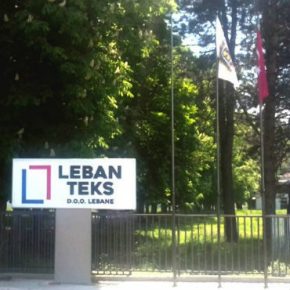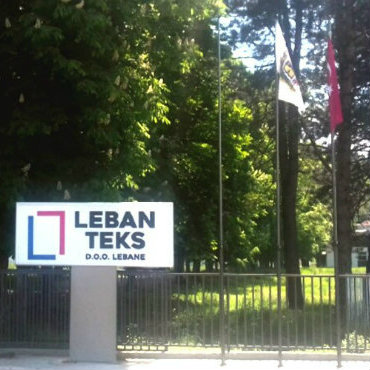Tydzień w gospodarce
Category: Raporty
Analyst, journalist specializing in the Western Balkans and Middle East domestic and foreign affairs

Ormo Group’s factory in Serbia (Lebanteks d.o.o., Public domain)
He thinks that Serbia has made significant progress in attracting Turkish investments and that this is a completely new circumstance that every investor will have in mind when making the final decision. „It worries us, because the crisis in Turkey cannot be without repercussions for us. We have Turkish textile factories that came here because of lower costs, and with the fall of TRY they automatically have lower costs in Turkey and increased ones in Serbia,” Ljajić said. He added that the salary of TRY1.6m before the fall of the Turkish currency was worth EUR450, and after it is worth EUR250. „If this situation is maintained, it will surely affect potential investors. None of them come to Serbia because they love it, but because of economic interest,” Ljajić says.
For the time being, the fall of the TRY will only be felt by Serbian tourists going on vacation to Turkey. Tourism arrangements will not be cheaper because they have been concluded much earlier, but for about 40,000 Serbian tourists, as well as for all others, shopping and general spending in Turkey will be cheaper. The fall in the value of the TRY against the EUR and the USD in the short term will not affect the economic cooperation between Serbia and Turkey.
The process of depreciation of the Turkish currency has been significant since the end of April this year. However, the additional fall that occurred lately are worrisome for Serbia in the long run. At this point Serbians do not see any significant threats to the Serbian-Turkish cooperation, which is on the upward path. This was also a thinking at the National Bank of Serbia, especially when it comes to the financial market, and in particular to the Turkish investments, mainly focused on the textile industry and the production of some components for the automotive industry, and certainly there are investment announcements in infrastructure projects.
Turkey is among Serbia’s most important economic partners. Foreign trade was worth EUR1bn last year. According to the data for the first six months this year, Serbia’s exports amounted to about EUR140m, while Turkey’s imports amounted to more than EUR400m. What is certainly important, when talking about the impact on the economy of Serbia, is that the decline in the value of the TRY in the long run can jeopardize the number of investments given the high cost of borrowing in the Turkish national currency, which is why many businessmen decided to borrow in foreign currency because the costs were lower. The depreciation of the TRY means that one has to allocate more funds to reimburse one’s existing obligations, which leaves less room for further investment. There is also an effect of the double-digit inflation, which poses additional problems for Turkey. If this situation with TRY continues to develop negatively for Turkey, then the import of goods from Turkey would become more expensive, which could indirectly affect the decline of Serbia’s exports.
The insurance costs against the bankruptcy of the Turkish state (measured by a five-year CDS swap) increased to the levels seen during the 2008-09 crisis, which meant that the markets considered it more likely that Turkey would cease to fulfil its obligations than, for example, Ukraine or Pakistan. The main reason for the weakness of the currency and the high interest rate in Turkey is, in essence, quite simple: the country needs a hard currency to finance the payment of external debts that are due and to balance the current account. In order to provide the necessary funds for investors, interest rates must be high enough. Pressure on TRY already lasted for a long time as the costs of financing in USD grew due to the tightening of the monetary policy of the US Federal Reserve. When added to the recent news about the ultimatum of the US administration to release their citizens from custody, customs on imports of steel from Turkey, as well as the dramatic responses of the Turkish authorities that imposed customs on some American goods, they only poured oil on fire.
In beginning of 2018, Turkey and Serbia ratified the Free Trade Agreement, which allows export of 5,000 tons of beef from Serbia to Turkey. In addition, this agreement will, for the first time, allow duty-free exports from Serbia to Turkey of a limited amount of raw and refined sunflower oil, sunflower seeds and certain types of bakery products. Serbia would be able to export to Turkey 25,000 tons of raw sunflower oil, 10,000 tons of refined, 15,000 tons of sunflower seed, 5,000 tons of soybean, 500 tons of industrial feed, 500 tons of food for dogs and cats, and 500 tons of coats. On the other hand, Turkey should double its pea exports to Serbia from 350 to 700 tons, beans from 300 to 600 tons, sugar maize from 1,000 to 2,000 tons and dry plums from 200 to 400 tons. As previously announced, Serbian businessmen will be able to import without any customs duties pomegranate, strawberry, eggplant, zucchini, and grapes.
Economic relations between Serbia and Turkey began to develop significantly more than nine years ago when the Free Trade Agreement was signed. Since then, Serbian export Turkey has increased 7.5 times, while the total foreign trade has increased 3.5 times. In the last 10 years, the investment of the Turkish economy in Serbia is on the upward path. Thus, in 2007, the net investment in money, according to the National Bank of Serbia data, from Turkey to Serbia was EUR352,000, and in 2013 as much as EUR1,7m. The net investment of Turkish residents in Serbia in 2014 was EUR2m, a year later EUR27.7m, and in the first half of 2016, EUR1.7m.
Regarding the wider SEE region, given that exports of countries to Turkey range from 1 to 4 per cent of total exports (Romania — 4 per cent and Serbia — 3 per cent) and only 0.4 to 1.3 per cent of GDP, the negative effects are not too strong. Unlike Turkey, it is said that countries in the region can generally boast a surplus or a good balance of current transactions, net external debt is falling from the crisis, and inflation is also on a low single-digit level. Although the local currencies recorded a moderate fall due to the collapse of the Turkish market and an additional drop could be expected if the situation in Turkey worsens further, such a fall in the SEE should not cause major problems. Additionally, if Turkish problems are loosened in the near future, this would have a positive effect on the SEE markets.
Still, desired Turkish investments for Serbia may fallout, especially expectations to reach EUR3-4bn in trade. Some larger infrastructure projects are also in process, based on the Memorandum of Cooperation with Turkish construction company Taşyapi. According to it, the Turkish company should make technical and financial proposals for several infrastructure projects in Serbia. This is a renovation of the regional roads Novi Pazar-Tutin and Aljinovići-Sjenica-Novi Pazar, as well as the construction of both sections of the Belgrade-Sarajevo highway that are located in Serbia, from Kuzmin to Sremska Rača, and from Požega to Kotroman, i.e. the border with Bosnia.
The last major Turkish investment in Serbia was in December last year with EUR500,000 worth of investment by Ormo Group which opened the Lebanteks factory in Leban. In the first factory, after 30 years, first new jobs were given to 300 workers, with perspective of more employment. Ormo Group is the largest exporter of wool in the world, and Lebanteks is the first factory opened outside Turkey. Some other big Turkish factories opened their branches in Serbia: in October 2016, Aster (one of the biggest textile companies in Turkey) opened a factory in Niš, with a plan to employ up to 2,000 workers. Tibet Moda opened a textile company in Ćuprija, while Teklas Automotive invested more than EUR11m in a factory in Vladičin Han. In April 2017, Büreleşik bought Beko factory, and in October last year Taypa Textil Güylim invested EUR35m in Kraljevo factory.
Vedran Obućina is an analyst and a journalist specializing in the Croatian and Middle East domestic and foreign affairs. He is the Secretary of the Society for Mediterranean Studies at the University of Rijeka and a Foreign Affairs Analyst at The Atlantic Post.


